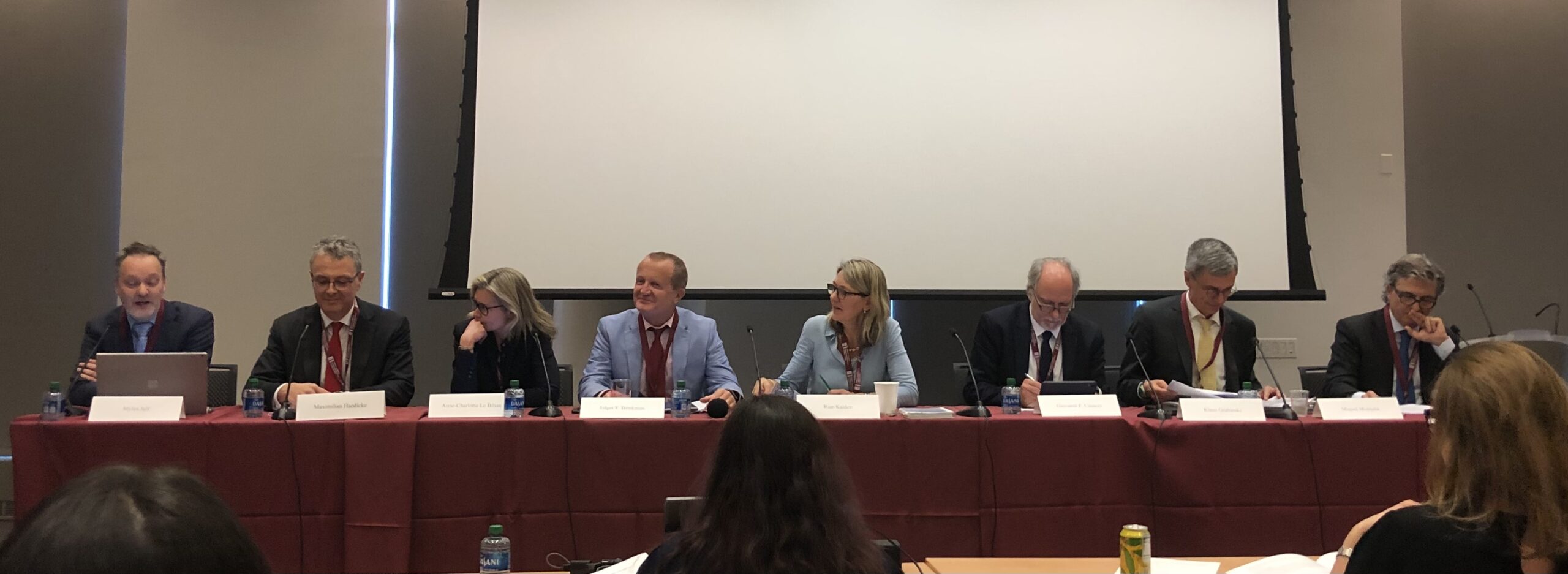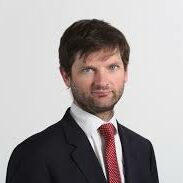“Maximilian Haedicke said that the ‘bumps in the road’ are now in the past and ‘there is a clear road ahead.’ But he added that challenges remain: ‘One challenge is how will the law be created and further developed?'”

Fordham IP Conference Panel on UPC
Three judges of the new Unified Patent Court took part in a panel discussion about the new system at the Fordham IP Conference on April 13.
Introducing the panel, Myles Jelf of Bristows LLP in London emphasized that the UPC is a completely new Court, which will have a huge impact on patents globally. He stressed that it is an amalgam of existing procedures: “In the UPC those procedures will surely come to have their own character and usage. As we stand here today, we have no precedents, case law or customs as to what those procedures will be.”
A Rocky Road
Maximilian Haedicke, Albert-Ludwigs-Universität Freiburg, Freiburg who is a member of the UPC Central Division in Paris, summarized the developments over the past 50 years that have led to the UPC, from the European Patent Convention in 1973 and the Community Patent Convention in 1975 (which was never implemented) through various unsuccessful initiatives before the UPCA breakthrough in 2013. Following German ratification earlier this year, the new Court will finally open on June 1 2023.
Haedicke said that the “bumps in the road” are now in the past and “there is a clear road ahead.” But he added that challenges remain: “One challenge is how will the law be created and further developed? There needs to be a coherent body of law established and I think we will get there eventually. We are not following precedents on one jurisdiction. All the law has to be settled and put together again.”
He added that other challenges include how the judges and divisions will work together, the relationship between expert and technical judges, deliberations between judges, and the innovative Case Management System.
Rules on Evidence
One of the most important features of the Court is how it will deal with evidence. Rian Kalden, of the UPC Court of Appeal in Luxembourg and member of the Court of Appeal of The Hague in the Netherlands, explained that the UPC provisions on evidence are derived from the EU Enforcement Directive.
“It’s a front-loaded system. Everything you request from the Court has to be accompanied by all the evidence you have in the written phase. But the Court can also request a party to provide evidence in its possession,” said Kalden. In practice, she advised: “Don’t wait too long to hand in your evidence. You cannot normally bring new facts and evidence on appeal.”
Kalden discussed the principles behind the rules on evidence, including the right to be heard, protection of confidential information, proportionality and fairness, and free evaluation of evidence. “It will not be a fishing expedition. The applicant must substantiate the facts and specify the evidence they are requesting, and you can only get evidence relevant to the stage of proceedings you are in,” she said.
Information can be requested if the detail is unknown as long as the request is specific, said Kalden (for example if you want information from someone with a particular role in a company but you don’t know their name). She also highlighted some strict time limits in the UPCA, for example for starting proceedings.
Opt-Out Trends
One aspect of the new system that has been in effect since March 1 is the ability to opt-out European patents and patent applications from the Court’s jurisdiction. The latest data from the Court indicates that there have been about 14,000 such requests (out of an estimated 1.5 million eligible patents and patent applications).
Edger F. Brinkman, a member of the UPC local division in The Hague, said “To UPC or not to UPC” is an important decision for patentees, with arguments both for and against: “In favor, you have one Court for 17 countries so that is a big blow to a competitor with an infringing product. It will save legal fees and remove patchwork problems. Judges are meant to be experienced and knowledgeable. But we have no case law yet and in some cases a patchwork is desirable.”
He noted that there is speculation in particular about opting out basic and secondary patents in the pharmaceutical sector, divisionals, and SEPs.
Unresolved Questions
One of the big questions about the new Court is its relationship with EU law, and the possibility of referrals to the CJEU. Anne-Charlotte Le Bihan, Bird & Bird AARPI in Paris, pointed out the tension in that the Court is regulated by an international treaty, which is not part of EU law, while the unitary patent is governed by an EU regulation.
She said the big question is about substantive patent law. The “common belief” is that CJEU would not have competence but Le Bihan pointed out that it has previously claimed competence in “common commercial policy,” which encompasses commercial aspects of intellectual property, including those parts that deal with substantive patent law. “It will depend on judges to refer those questions to the CJEU,” she said.
Another issue was raised by panelist Miquel Montañá of Clifford Chance LLP in Barcelona. He pointed out that one interpretation of Article 89 of the UPCA is that it requires ratification by the UK, which has decided not to join the system. He raised the possibility that this could lead to the judges and other officials of the Court being declared illegitimate. “Someone will have to interpret whether these conditions have been fulfilled,” said Miquel Montañá, adding: “Politicians have tried to sweep this issue under the rug.”
The panel was completed by Giovanni F. Casucci of EY Studio Legale Tributario in Milan and Klaus Grabinski, President of the UPC Court of Appeal in Luxembourg. Grabinski rejected the argument that the UPC would be obliged to refer questions on substantive patent law to the CJEU: “My interpretation would be that the European legislator decided to do something different and that has to be respected. So my takeaway is that the UPC is in the same position as national courts.”
Grabinski also addressed the potential for bifurcation of infringement and validity, as happens now in the German system, saying: “The expectation is that there will not be many bifurcations, and the aim will be to keep the claim and counterclaim together.” He said there will be exceptions, for example where infringement is brought before different divisions and there are also counterclaims: “In that situation, all the counterclaims will be sent to the Central Division. They will try to decide as soon as possible and there is a risk that it will be later than the infringement cases. But they can decide whether or not to wait for the revocation decision based on the prospect of success of the revocation action.”
A New Start
Haedicke said there are lots of reasons to be optimistic about the new system: “It’s going to be a big success. The challenges are there to be overcome.”
The judges agreed that, as Grabinksi said: “The UPCA and the Rules of Procedure are the primary source of law; national law and practices are not relevant until the point of enforcement.” Brinkman added: “Whatever we have decided or done before has no bearing on what we decide at the UPC.”
Grabinksi, who has led training of UPC judges in Budapest, Hungary in the past few months, said his advice to them is: “Forget about what we are doing now in our countries. Think UPC!”
The 35th Fordham IP Conference took place in New York from April 13-14. Apart from the UPC, topics covered included FRAND, plausibility, metaverse and NFTs, artificial intelligence, injunctions, forum shopping and extraterritoriality, and diversity in IP.

![[IPWatchdog Logo]](https://ipwatchdog.com/wp-content/themes/IPWatchdog%20-%202023/assets/images/temp/logo-small@2x.png)

![[Advertisement]](https://ipwatchdog.com/wp-content/uploads/2024/05/Quartz-IP-May-9-2024-sidebar-700x500-1.jpg)
![[Advertisement]](https://ipwatchdog.com/wp-content/uploads/2024/04/Patent-Litigation-Masters-2024-sidebar-last-chance-700x500-1.jpg)

![[Advertisement]](https://ipwatchdog.com/wp-content/uploads/2021/12/WEBINAR-336-x-280-px.png)
![[Advertisement]](https://ipwatchdog.com/wp-content/uploads/2021/12/2021-Patent-Practice-on-Demand-recorded-Feb-2021-336-x-280.jpg)
![[Advertisement]](https://ipwatchdog.com/wp-content/uploads/2021/12/Ad-4-The-Invent-Patent-System™.png)






Join the Discussion
No comments yet.